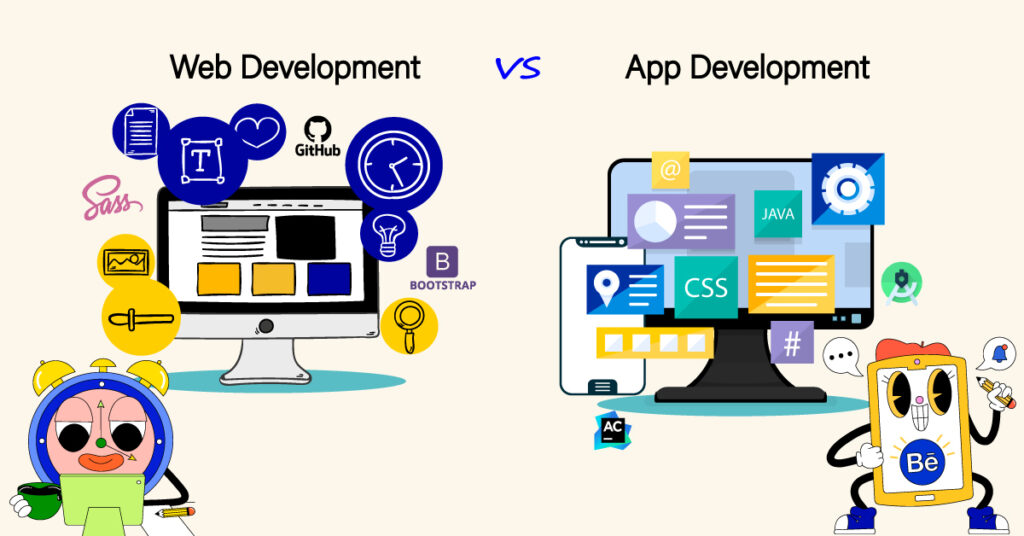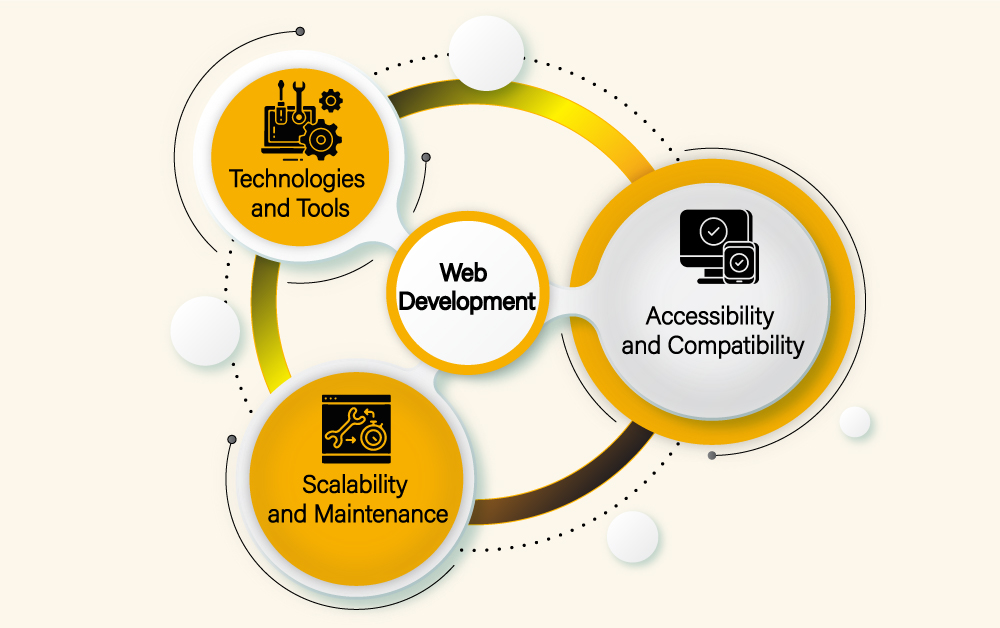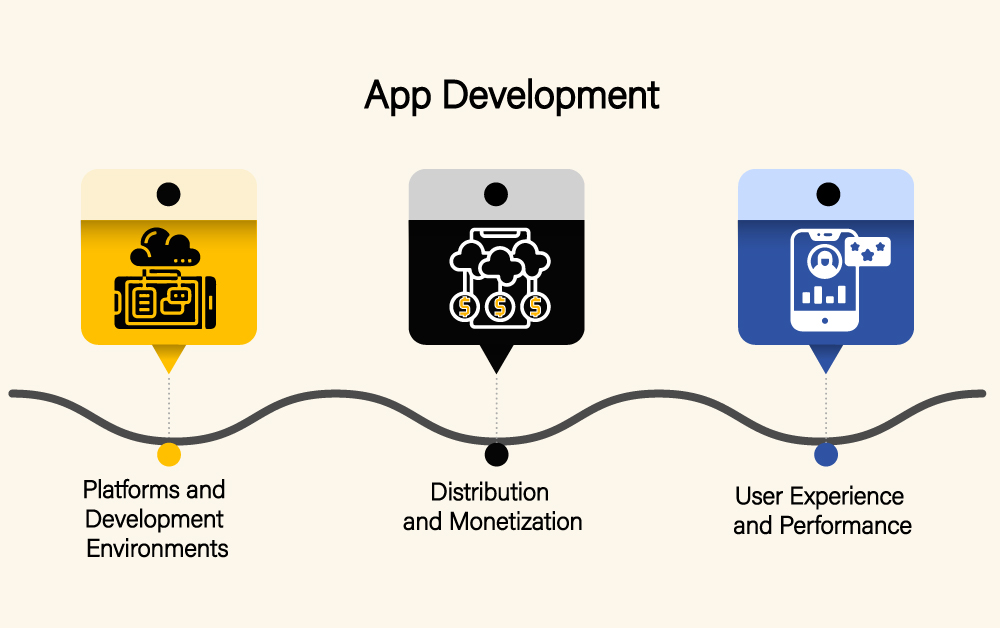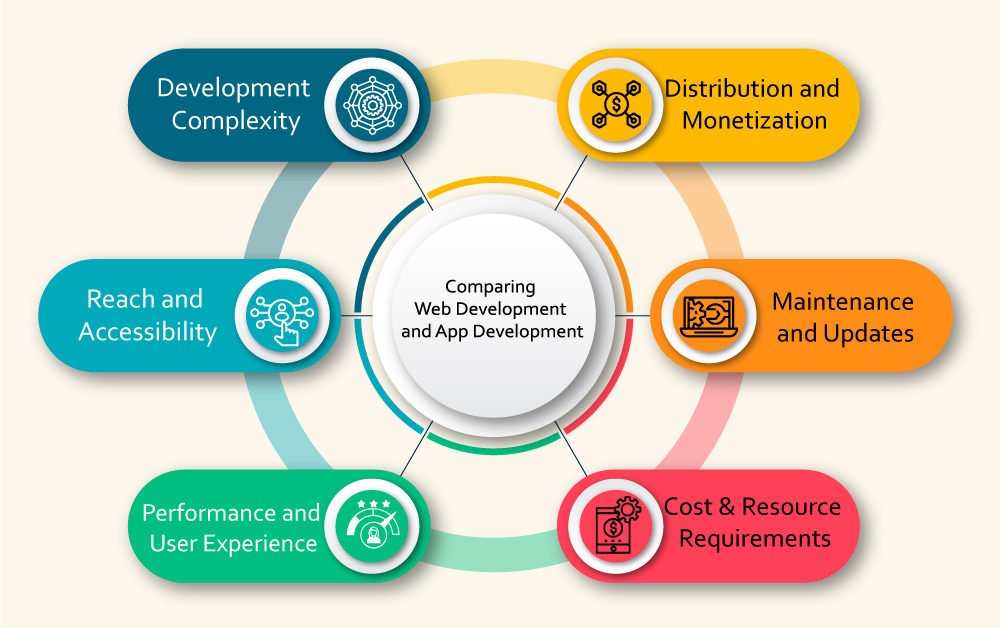
Looking forward to learning about Web Development vs App Development? You are at the right place. In the digital age, where technology plays a crucial role in shaping our lives, the development of websites and applications has become integral for businesses, organizations, and individuals alike. Whether you’re a seasoned developer, a tech enthusiast, or a business owner aiming to establish a strong online presence, understanding the nuances between web development vs app development is vital.
Each domain has its own set of intricacies, benefits, and challenges, making the decision between the two a crucial one. In this comprehensive guide, we’ll delve deep into the realms of web development vs app development, comparing and contrasting their features, functionalities, and applications to help you make an informed choice.
Table of Contents
Understanding Web Development

Before understanding web development vs app development, let’s first understand the each term in detail. Web development encompasses the creation and maintenance of websites, web applications, and web services. It involves a combination of programming languages, frameworks, and tools to design, build, and deploy digital assets accessible through web browsers. Websites serve as virtual storefronts, information hubs, and interactive platforms, catering to a global audience with varying needs and preferences. Here are some key aspects of web development:
Technologies & Tools
Web development relies on a variety of technologies and tools tailored to different aspects of the development process. HTML (Hypertext Markup Language), CSS (Cascading Style Sheets), and JavaScript form the backbone of web development, enabling developers to structure content, define layouts, and add interactivity to web pages. Additionally, frameworks and libraries like Bootstrap, React, Angular, and Vue.js streamline development by providing pre-built components, templates, and utilities.
Content Management Systems (CMS) such as WordPress, Drupal, and Joomla offer a user-friendly interface for creating, managing, and publishing web content without extensive coding knowledge. They empower users to build complex websites with ease, incorporating features like blogging, e-commerce, and multimedia integration.
Accessibility & Compatibility
One of the major advantages of web development is the universal accessibility of web-based content. Websites are accessible across various devices and platforms, including desktop computers, laptops, smartphones, and tablets, without the need for additional installations or downloads. Responsive web design techniques ensure that websites adapt seamlessly to different screen sizes and resolutions, providing optimal viewing experiences for users on diverse devices.
Compatibility with different web browsers is another crucial consideration in web development. Developers strive to ensure that websites render consistently across popular browsers such as Google Chrome, Mozilla Firefox, Apple Safari, and Microsoft Edge, addressing compatibility issues through cross-browser testing and optimization techniques.
Scalability & Maintenance
Scalability refers to the ability of a website to handle increasing levels of traffic, content, and user interactions without compromising performance or stability. Web developers employ scalable architectures, caching mechanisms, and performance optimization techniques to ensure that websites can accommodate growing demands over time. Cloud hosting services like Amazon Web Services (AWS), Microsoft Azure, and Google Cloud Platform offer scalable infrastructure solutions, enabling websites to scale resources dynamically based on traffic patterns and workload demands.
Maintenance is an ongoing aspect of web development, involving updates, security patches, and bug fixes to keep websites running smoothly and securely. Content updates, feature enhancements, and design refinements are also part of the maintenance process, ensuring that websites remain relevant and engaging for users.
Use Cases and Examples

Web development caters to a diverse range of use cases across industries and sectors. From corporate websites and e-commerce platforms to social networking sites and online marketplaces, the applications of web development are extensive and varied. Popular examples of websites include:
- Amazon: A leading e-commerce platform offering a vast array of products and services to customers worldwide.
- Facebook: A social networking site connecting billions of users and facilitating communication, sharing, and networking.
- YouTube: A video-sharing platform where users can upload, view, and interact with a wide range of video content.
Exploring App Development

App development, on the other hand, focuses on creating software applications designed to run on specific devices or platforms, such as smartphones, tablets, and desktop computers. Mobile app development, in particular, has gained significant traction in recent years, driven by the widespread adoption of smartphones and tablets across the globe. Here are some key aspects of app development:
Platforms & Development Environments
App development encompasses multiple platforms and operating systems, each with its own set of development tools, languages, and frameworks. For mobile app development, the two dominant platforms are iOS (Apple’s mobile operating system) and Android (Google’s mobile operating system). iOS apps are typically developed using Swift or Objective-C programming languages and Xcode IDE (Integrated Development Environment), while Android apps are built using Java or Kotlin and Android Studio IDE.
Cross-platform app development frameworks such as React Native, Flutter, and Xamarin offer alternatives for developing apps that can run on multiple platforms with shared codebases.
User Experience & Performance
User experience (UX) plays a critical role in app development, as mobile apps are often used in contexts where speed, efficiency, and usability are paramount. App developers focus on creating intuitive interfaces, smooth navigation flows, and responsive interactions to enhance the overall user experience. Design principles such as material design (for Android apps) and human interface guidelines (for iOS apps) provide frameworks for designing visually appealing and user-friendly interfaces.
Performance optimization is another key consideration in app development, especially for resource-intensive apps like games and multimedia applications.
Distribution & Monetization
App distribution and monetization strategies vary depending on the platform and business model adopted by developers. For iOS apps, distribution is primarily through the Apple App Store, while Android apps are distributed via the Google Play Store. App stores provide a centralized marketplace for users to discover, download, and install apps, offering developers a platform to reach a wide audience.
Monetization options for apps include various models such as freemium (offering free and premium versions), in-app purchases, subscriptions, and advertising. Developers can choose the monetization strategy that aligns with their app’s purpose, target audience, and revenue goals. App analytics tools and advertising networks enable developers to track app usage, user engagement, and revenue metrics, allowing them to optimize their monetization strategies over time.
Use Cases & Examples

App development spans a diverse range of use cases and industries, catering to the specific needs and preferences of users. From productivity tools and entertainment apps to fitness trackers and financial services, mobile apps have become an integral part of modern lifestyles. Some popular examples of mobile apps include:
- Instagram: A social media platform focused on photo and video sharing, offering features such as filters, stories, and direct messaging.
- Uber: A ride-hailing app that connects passengers with drivers for on-demand transportation services.
- Candy Crush Saga: A popular mobile game featuring addictive puzzle-solving gameplay and in-app purchases for power-ups and extra lives.
Web Development Vs App Development

Now that we’ve explored the key aspects of web development and app development, let’s learn about Web Development vs App Development across various dimensions:
1. Development Complexity
Web Development: Development complexity is one of the major points when discussing Web Development vs App Development. Web Development is generally considered less complex compared to app development, as it involves building websites that are accessible through web browsers on various devices. However, complex web applications with advanced functionalities may require extensive development efforts.
App Development: This can be more complex, especially for native app development targeting specific platforms like iOS and Android. Cross-platform development frameworks offer alternatives for simplifying development but may have limitations in terms of performance and platform-specific features.
2. Reach & Accessibility
Web Development: It offers broader reach and accessibility, as websites can be accessed across different devices and platforms without the need for installation or downloads. Provides instant access to content through web browsers.
App Development: Provides a more immersive and personalized user experience, with access to device-specific features and functionalities. Requires users to download and install apps from app stores, which may create barriers to entry for some users.
3. Performance & User Experience
Web Development: User experience may vary depending on factors such as internet connection speed, browser compatibility, and device capabilities. Responsive design techniques aim to optimize performance and usability across different devices.
App Development: Offers more control over performance and user experience, with access to device hardware and native APIs. Can provide smoother interactions, faster loading times, and richer multimedia experiences compared to web applications.
4. Distribution and Monetization
Web Development: Websites are typically monetized through methods such as digital marketing, sponsored content, subscription services, and e-commerce transactions. Distribution is decentralized, with websites accessible through search engines, social media, and direct URLs.
App Development: Apps are distributed through centralized app stores, providing a curated marketplace for users to discover and download apps. Monetization options include in-app purchases, subscriptions, advertising, and premium app sales, with revenue-sharing models enforced by app store policies.
5. Maintenance and Updates
Web Development: Another point for web development vs app development is maintenance and updates. Web development requires regular maintenance for updating content, fixing bugs, and addressing security vulnerabilities. Changes can be implemented directly on the web server, with instant updates visible to users.
App Development: Maintenance involves releasing updates through app stores, which may require approval and review processes by platform providers. Updates are distributed to users through app store notifications or automatic updates, depending on user settings.
6. Cost and Resource Requirements
Web Development: Generally involves lower upfront costs and resource requirements compared to app development, especially for simple websites and content management systems. Hosting fees, domain registration, and development tools may incur ongoing expenses.
App Development: This can be more costly and resource-intensive, especially for native app development targeting multiple platforms. Costs may include development tools, developer licenses, app store fees, and marketing expenses.
Closing Words
Both web development and app development offer unique opportunities and challenges for individuals and businesses seeking to establish a digital presence. The choice between the two depends on various factors such as target audience, objectives, budget, and technical requirements.
Here are some key considerations to help you make the right decision:
- Audience Reach: If your goal is to reach a broad audience across different devices and platforms, web development may be the ideal choice due to its universal accessibility.
- User Experience: For applications requiring immersive and interactive experiences tailored to specific devices, app development offers greater control over performance and user experience.
- Development Complexity: Consider the technical expertise and resources available within your team or organization, as well as the complexity of features and functionalities required for your project.
- Monetization Strategy: Evaluate the various monetization options available for web and app platforms, and choose the strategy that aligns with your revenue goals and target audience.
- Long-Term Maintenance: Factor in the ongoing maintenance and update requirements for your digital assets, including content updates, security patches, and platform compatibility.
Ultimately, whether you choose web development vs app development, the key to success lies in understanding your audience, defining clear objectives, and leveraging the right tools and technologies to deliver engaging and meaningful digital experiences. By carefully weighing the pros and cons of each approach, you can embark on your digital journey with confidence and clarity, driving growth and innovation in the ever-evolving landscape of technology and connectivity.



